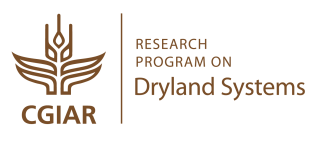Achievements of Date Palm Integrated Pest Management and Agricultural Extension and Technology Transfer Systems in Abu Dhabi
Published on: January 7, 2021, Submitted by Zaib Un-Nisa on: November 1, 2016
ADFCA is tackling major date palm pest infestations in Abu Dhabi through precision-system-informatics, farm-system optimization
ICARDA Logo
This project is enhancing agricultural production systems in Abu Dhabi through initiating a comprehensive research program and a digital extension system addressing integrated pest management for tackling major date palm pest infestations, as well as crop, water and production management of vegetables, date palms and irrigated forages in Abu Dhabi. Project is developing suitable technology packages like a precision-system-informatics which can provide accurate, on-time and interactive information base for developing, testing and implementation of improved-integrated pest management IPM, crop varieties, inter cropping, inputs use efficiency, soil-water-nutrient-balance, agronomic practices, market economics etc.
After evaluating the existing agricultural extension and technology transfer systems, it turned out that the existing e-diary was used for exclusively statistical and farm registration purposes for various farming systems in Abu Dhabi Emirate (date palm, forage crops, open-field vegetables, fruit trees, soil and soil-less crops in green houses) which will be replaced by “Smart Extension Diary (SED)" (software for tablets) through this project. It is being designed to bring improvements in the agriculture extension system. Till now, field testing of SED hardcopy has been done, coupled with some short training courses on Agricultural extension targeting capacity building of Subject Matter Specialists and Farmer’s Relation Managers only. Later on, Field extension staff will use these tablets during their regular farm visit.
Besides improving the efficiency of agricultural extension and technology transfer systems, their priority is to up skill ADFCA researchers and technicians in Date Palm IPM and other technology transfer systems. For this reason, the project organized nine training courses and several training workshops in which more than 200 participants from ADFCA, ADFSC and other related institute in Abu Dhabi actively participated. Based on present date palm IPM activities, several recommendations by field experts are also highlighted for the system improvement and enhancement. Moreover, several biological control measures are suggested for vegetable crops under protected agriculture, to improve integrated agricultural practices which are contributing to CGIAR strategic goals e.g. increased income with more livelihood opportunities for farmers and more efficient use of inputs in agriculture.
In Abu Dhabi, farmers use pesticides for about 3.5 million date palm trees twice a time in a year which has considerable negative effect on the environment (water, health, bees, pollinators, natural enemies). Moreover, same category of pesticides are being used by the farmers for all date palm pests i.e. Red Palm Weevil, borers, and lesser date moth and dust mite. Adding to the problem, existence of abandoned farm as breeding grounds for pest is another big challenge for achieving success in IPM. Nevertheless, these issues are being addressed by flowering medicinal plants in conserving and enhancing beneficial insects, which are expected to generate additional income for farmers. Another achievement in biological control measures is the introduction of bio-pesticides, repellent plant products (push-pull strategy) and entomopathogenic fungi. Management is being further improved by growing selective pest resistant date palm varieties. This is how, these biological control measures are replacing conventional use of pesticides and insecticides.
Dr. El Bouhssini strongly advocates the enforcement of strict quarantine measures in the country to avoid re-infestation of “cleaned” regions and entry of new pests to the country/regions. He provided a full fledge research and training work plan for the next 4-5 years. On the other hand, after doing a thorough socio-economic review and assessment on date palm IPM, Dr Kassam Shinan, ICARDA socio-economist, highlighted in his report, an imperative role of state in updating policies related to farm settlement, coupled with the nature of mobility of south Asian and Egyptian farm in the provision of extension and advisory services. These advisory services are meant to impart knowledge and education in order to address concerns about resource efficiency and aimed at improving farm profitability. However, from a migrant farm labor perspective, the adoption of IPM may pose significant risks. So, according to him, the decision to adopt IPM must be made by farm owners as opposed to migrant farm laborers and farm managers. The adoption of IPM is, therefore, likely to require regulatory oversight and enforcement and given the federal mandate of the Ministry of Environment, a consensus among all Emirates. Apart from IPM regulation, he proposed that broad uptake of IPM options is feasible through introduction of new commodities, economic incentives for adoption of IPM and presence of effective agricultural innovation systems.
" Farm system optimization can be achieved by inclusion of livestock concerns" , Dr Kassam Shinan suggested.
In Abu Dhabi, forage production is an integral part of production systems with some historical affinity for date palms and vegetables. The main cultivated forages are Rhodes grass, alfalfa and Blue panic. Two other forages, Buffel grass and Bajra Napier hybrid grass, are gaining more importance due to their higher water use efficiency, salinity tolerance and high productivity. Moreover, grass, are gaining more importance due to their higher water use efficiency, salinity tolerance and high productivity. However, Cactus - a drought tolerant plant is also being used as fodder bank to alleviate livestock feed shortages during prolonged dry periods.
According to Dr Azaiez Ouled Belgacem, Project Manager, Alfalfa is not a recommended crop in the water scarce country because it consumes huge amount of water. Secondly, drip irrigation is comparatively a better option for Abu Dhabi than sprinkle irrigation systems due to its hot dry climate, sandy soil and saline water conditions. Last but not least, experts strongly recommend installation of a seed unit in research stations of ADFCA or ADFSC for sufficient distribution of Buffel grass fields to the farmers.
The major risk to the crops can be a dust event. The UAE is one of the places where dust storms are becoming more frequent, said Dr Abdullah Al Mandoos, executive manager of the National Meteorology and Seismology Centre in Abu Dhabi, Todorova, V. (2013, May 7). As we know that Abu Dhabi lies in dust prone region where dust storms are frequent and considered as a seasonal event, it can pose a serious threat to the production and management of cash crops in the region, it is expected that some important preventive measures will be taken into account for safe execution and continuity of the project.
Acknowledgement
This research & development project is being conducted by Abu Dhabi Food Control Authority in collaboration with ICARDA, under CGIAR research program on Dryland Systems which is expected to be complete in the end of the year 2016.




